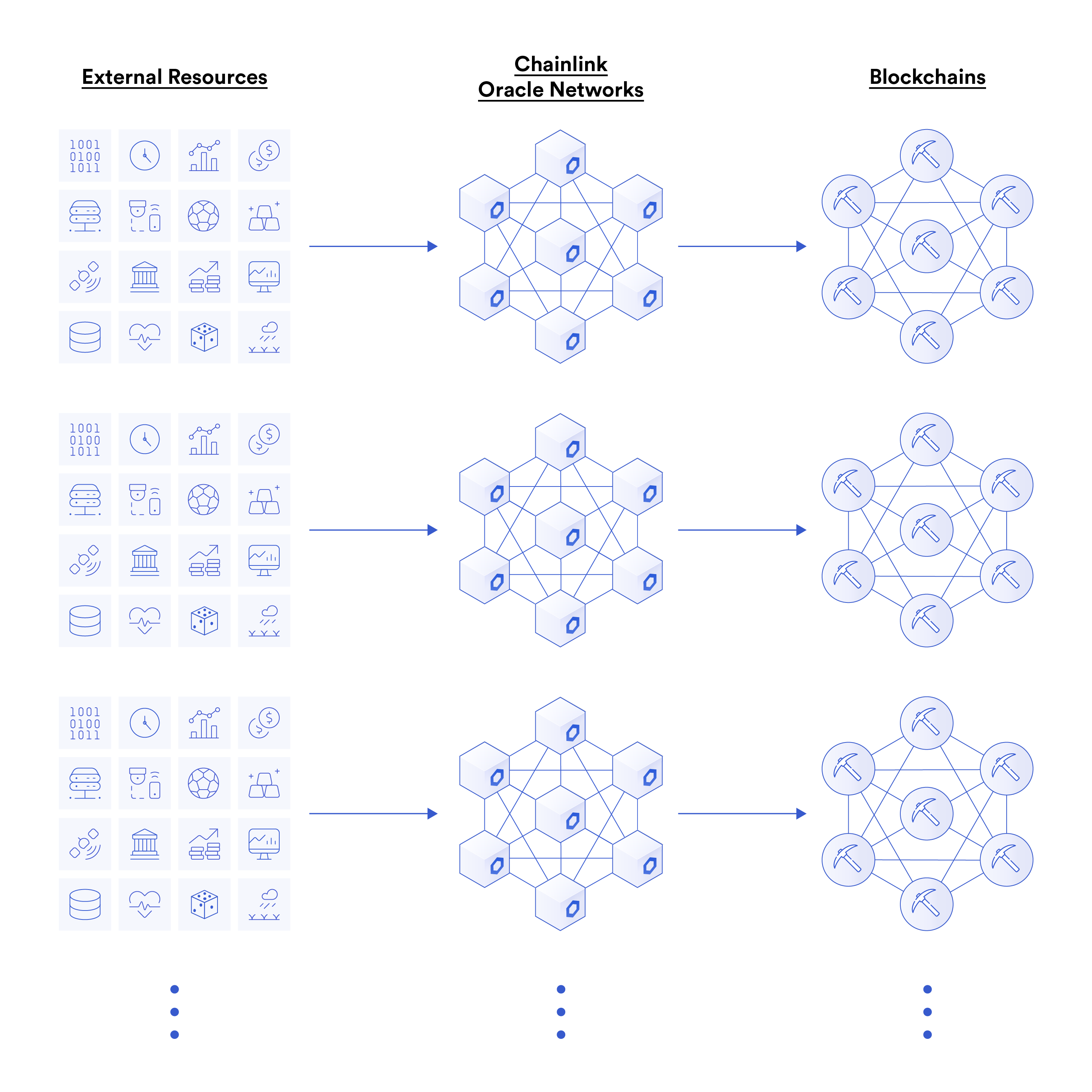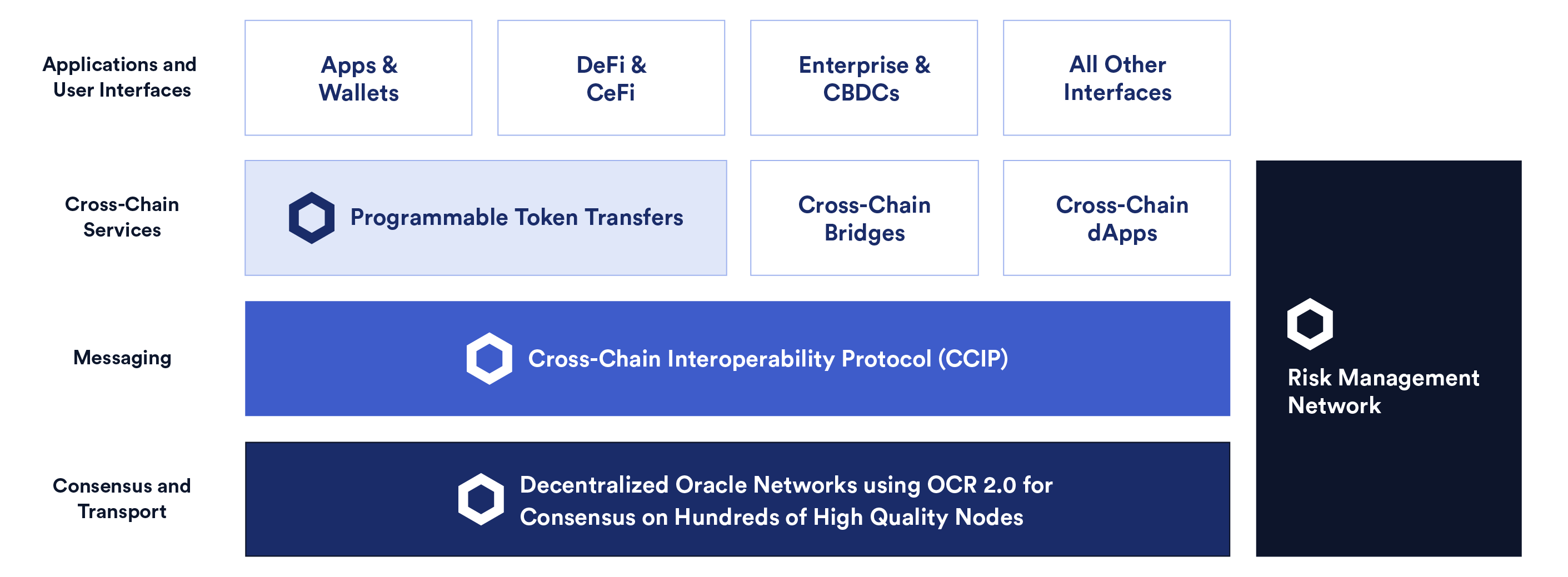Chainlink’s Blockchain Agnostic Design: Native Oracle Support for Any Network
The smart contract ecosystem is increasingly shifting towards a multi-chain future. Blockchain adoption is not isolated to any one network but instead taking place across an ecosystem of various decentralized ledgers, each with its own unique value propositions and technical capabilities. Different blockchains and layer 2 solutions optimize for different consensus algorithms, security models, programming languages, hardware requirements, and more. This provides flexibility for both developers and users who can choose which network best suits the smart contract use cases they wish to build and interact with.
However, common to all blockchain and layer 2 networks is that they are isolated from the real world, what is known as the “oracle problem.” Overcoming this obstacle requires an additional piece of infrastructure known as an oracle, which provides blockchains, and the smart contract applications they support, access to a secure and reliable source of external data and off-chain computation.
As a blockchain-agnostic and heterogeneous framework for building decentralized oracle networks, Chainlink actively supports the multi-chain ecosystem by providing developers the secure oracle infrastructure required to build hybrid smart contracts on the blockchain network of their choice. Chainlink oracle networks already secure tens of billions of dollars across a number of the leading blockchain networks, including Ethereum, BNB Chain, Polygon, Gnosis Chain, Heco, Avalanche, Fantom, Arbitrum, Harmony, Optimism, Moonriver, Moonbeam, Solana, and more. The oracle networks operating natively on each blockchain network can be explored within the Chainlink documentation.
Chainlink’s ability to service such a wide array of blockchain networks with native oracle support has been made possible by the talented development teams supported by the Chainlink Community Grants Program, who have successfully integrated, tested, and monitored the deployment of Chainlink oracles onto a variety of blockchain networks. Through this program, additional blockchain networks are currently under the integration process including Klaytn, RSK, Cosmos, Celo, Stacks, Plasm, Edgeware, OKExChain, and more. As support is integrated for additional blockchain networks, developers within those environments can build more advanced dApps that leverage off-chain resources, furthering the growth of that ecosystem.
However, not all approaches to designing blockchain agnostic oracle networks are created equal. In this article, we will explore key security considerations around blockchain-agnostic oracle designs, Chainlink’s unique approach to native blockchain agnosticism, as well as how this approach supports the development of the Cross-Chain Interoperability Protocol (CCIP).
Blockchain-Agnostic Decentralized Oracle Networks
Decentralized oracle networks directly secure the execution of smart contract applications by providing the data inputs and computation required to generate expected outputs. If the information delivered is corrupted or unavailable, a user’s contract will not execute as designed and could potentially lead to the loss of user funds. Therefore, the approach to blockchain agnosticism in oracle networks must be taken carefully so as to not compromise on the security, speed, or availability that users have come to expect from hybrid smart contract applications.
Risks of a Sub-Optimal Approach to Oracle Blockchain Agnosticism
One approach to blockchain agnosticism is to operate an oracle network on just one blockchain network and then bridge reported data to other chains using a relayer design. While this design does in theory provide a way to supply smart contracts on various blockchains with oracle reports, it also introduces significant trade-offs.

Firstly, because the oracle nodes in this design can only deliver data to just one blockchain directly, this means the frequency and costs of oracle updates across all other blockchains are limited by the speed and throughput of the primary blockchain. This creates a bottleneck, where even as higher-throughput and lower-cost blockchain and layer 2 networks are deployed and adopted, oracle updates are still limited by the primary blockchain from which data is bridged. This can increase costs for users and result in less frequent oracle updates compared to oracles running natively on that blockchain.
Secondly, a relayer design introduces increased latency, because users must wait not only for data to first be delivered on the primary blockchain—they must then wait for the data to be bridged to the secondary blockchain or layer 2 network that their smart contract operates upon. During times of market volatility and blockchain network congestion, this may result in stale data being delivered to smart contracts that can ultimately put protocols at risk of undercollateralization.
Thirdly, the relay model requires a set of highly available and incentivized third-party relayers that are ready to bridge oracle report data from one chain to another. Oftentimes, this takes the form of a single centralized relayer, which, if it experiences downtime, leaves users on every other blockchain without the data they require. Additionally, this can increase costs as users not only need to pay enough to cover the transaction fees of delivering the data onto the first blockchain network but also for the transaction fees of delivering the data onto the second blockchain.
Lastly, bridging oracle data from one blockchain to another introduces an array of severe dependencies. Users must trust that both the blockchain the oracle nodes deliver data directly to and the relayer mechanism used are both operating as designed without issues. This expands the scope of infrastructure that must be trusted and as a result, increases the attack surface of a user’s smart contracts.
Chainlink’s Approach to Native Blockchain Agnosticism
Chainlink’s approach to blockchain agnosticism follows a fundamentally different model from the relayer design. Rather than only delivering data to one blockchain network and bridging the data over to other chains, Chainlink oracle networks can deliver data directly to any blockchain or layer 2 networks without any cross-dependencies on any other blockchain networks or relayers. Ultimately, this means Chainlink oracle networks can operate directly on each blockchain, providing native oracle support for external resources and off-chain computation.

As a result, Chainlink oracle networks can operate at the native speeds and costs of any blockchain or layer 2 network, allowing smart contracts on higher-throughput and lower costs blockchains to benefit from higher frequency and lower-cost oracle updates. For example, Chainlink oracle networks on the Polygon mainnet are already updating data feeds at a rapid frequency, which could not be achieved if data was bridged from a lower throughput and/or higher cost blockchain.
Additionally, because oracle networks on one blockchain have no dependencies on any other blockchain, users have a greater degree of assurance that they will receive timely oracle updates even if other blockchains were to experience downtime issues. This degree of separation lowers the attack surface, reduces oracle update latency, and allows smart contracts to benefit from the unique feature set of the blockchain they choose to deploy upon. For example, Chainlink oracle networks on networks such as Ethereum do not depend upon the security or liveness of higher-throughput blockchains, helping ensure there are no additional trust assumptions required to deliver accurate oracle reports.
Lastly, because Chainlink oracle nodes can directly deliver data to the blockchain networks that consuming smart contracts operate upon, there is no need for third-party relayers. This increases reliability guarantees and mitigates the need for users to compensate for the transaction fees paid across multiple blockchain networks. Therefore, users are provided access to more fresh and cost-efficient oracle updates overall.
We work closely with the development teams of various blockchains and layer 2 networks to ensure the deep native integration of Chainlink oracles meets the long-term reliability and exact needs of their developer ecosystem. By not compromising on security, speed, or reliability, the Chainlink Network provides the multi-chain ecosystem a collection of blockchain agnostic decentralized oracle networks that are natively integrated to power hybrid smart contract applications in any environment. Furthermore, Chainlink will continue to expand its support for additional blockchain networks, supporting developers across the larger smart contract ecosystem.
Enabling an Interoperable Multi-Chain Ecosystem with CCIP
By virtue of natively supporting a wide range of blockchains and layer 2 networks, the Chainlink Network is well-suited to provide the multi-chain ecosystem with the most secure and reliable cross-chain messaging solution, enabling smart contracts to bridge commands and tokens across disparate on-chain environments. Importantly, avoiding the use of third-party relayers in its multi-chain design helps ensure there is no centralized point of failure when data is bridged across chains. With Chainlink’s increasing support for additional blockchain networks, a standard is being created to boost the growth of the multi-chain ecosystem.
Through the Cross-Chain Interoperability Protocol (CCIP), a global open-source standard for cross-chain messaging, developers will have the secure off-chain infrastructure required to create truly secure cross-chain applications and token bridges. CCIP will leverage the existing collection of hyper-reliable, Sybil-resistant, and blockchain agnostic Chainlink oracle nodes, which already secure tens of billions of dollars in DeFi applications across various blockchain networks. Through the creation of various secure bridges across different chains, all powered by the universal CCIP standard, users gain access to a seamless interoperability solution without the risks of centralization.
Watch Chainlink Co-founder Sergey Nazarov announce CCIP at the Smart Contract Summit #1:
The CCIP standard will be further secured through a newly invented risk management system called the Risk Management Network. The Risk Management Network will consist of decentralized oracle networks with independent committees of nodes that have the sole purpose of monitoring CCIP services for malicious activity and blockchain networks for liveness. Through this additional verification layer, emergency shutdowns can be automatically triggered, protecting users against potential black swan events.

With over a hundred blockchain networks working with Chainlink, and many already supported on mainnet, Chainlink is the ideal infrastructure to serve as a credibly neutral protocol for cross-chain communication between all blockchain and layer 2 networks. With an ever-expanding collection of blockchains supported by Chainlink oracles, developers have access to the wide range of decentralized services they need to build increasingly advanced hybrid smart contract applications.
—
If you’re a developer and want to connect your smart contract to Chainlink’s secure off-chain services, read the documentation at docs.chain.link. To discuss an integration, reach out to an expert.
